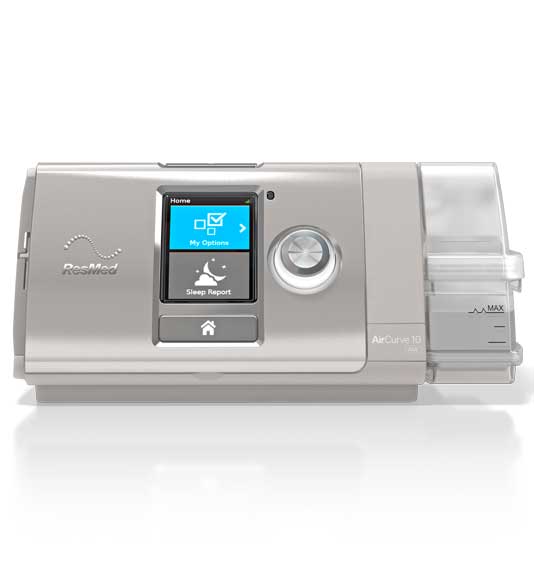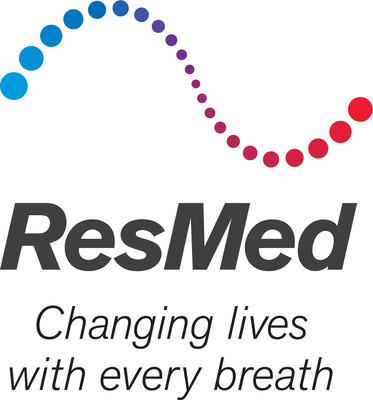New ResMed-sponsored Study Shows Promising Treatment Option for Patients with Untreated Central Sleep Apnea
- Largest-ever analysis of patients with treatment-emergent central sleep apnea shows switching from CPAP to ASV significantly improves compliance
- Study highlights the need to consider therapeutic options based on each patient's disease severity
MARSEILLES, France, April 6, 2017 /PRNewswire/ -- ResMed Inc. (NYSE: RMD) today announced that people with obstructive sleep apnea who develop central sleep apnea (CSA) are more compliant on therapy after they switch from continuous positive airway pressure (CPAP) therapy to adaptive servo-ventilation (ASV) therapy, according to the largest-ever analysis of patients with treatment-emergent CSA.
Experience the interactive Multimedia News Release here: https://www.multivu.com/players/English/74629525-resmed-central-sleep-apnea-asv-therapy/

The study analyzed anonymous, aggregated data from the devices of 198,890 telemonitored patients in the United States who were receiving positive airway pressure therapy for their sleep apnea. It showed that those with treatment-emergent CSA who switched from CPAP to ASV used their therapy longer and had significantly fewer apneas (breathing stoppages or reductions) during sleep:
- 62.7 percent: Patients' compliance on CPAP prior to switching
- 76.6 percent: The same patients' compliance after switching to ASV
"Achieving compliance through proper therapy usage is a well-recognized clinical goal in sleep apnea management, and one that is often hard to achieve, particularly in difficult-to-treat patients who may have untreated central sleep apnea," said Carlos Nunez, M.D., ResMed's Chief Medical Officer. "These findings underscore the importance of continuously monitoring central sleep apnea and rethinking the conventional wisdom on therapeutic options based on each patient's disease severity."
The study results were presented in an abstract at The European Respiratory Society and European Society of Sleep Research 2017 Sleep and Breathing conference in Marseilles, France. The opinion leaders and experts in the author group for the study include:
- Jean-Louis Pépin from Institut National de la Santé et de la Recherche Médicale (INSERM), U 1042, HP2 Laboratory (Hypoxia: Pathophysiology), Grenoble Alpes University, Grenoble, France
- Peter Cistulli from Charles Perkins Centre, University of Sydney, and Royal North Shore Hospital, Sydney, Australia
- Atul Malhotra from University of California San Diego, La Jolla, California, USA
About the study
This retrospective analysis compared compliance rates of 198,890 patients using anonymous, aggregated telemonitoring data from a U.S. positive airway pressure (PAP) therapy database. Three groups of patients were analyzed for compliance, device usage, and measures of disease severity: Those patients that started and stayed on CPAP (the "CPAP-only" group), patients that started and stayed on ASV (the "ASV-only" group), and patients that started on CPAP and switched to ASV (the "Switch" group). All patients in the analysis received CPAP via ResMed's AirSense™ 10 or ASV via ResMed's AirCurve™ 10 devices.
Compliance and device usage
The study used the U.S. Medicare definition of compliance: device usage for more than four hours per night on 70 percent of nights during a consecutive 30-day period anytime during the first three months of initial use.
In the "Switch" group, patients beginning on CPAP had the lowest initial compliance rate at 62.7 percent, but improved to 76.6 percent after switching to ASV. The low initial compliance seen in the Switch patients is possibly due to untreated CSA, based on their overall higher AHI – specifically their central apnea index (CAI) – during week one of therapy compared to the CPAP-only group. The 90-day compliance rates seen for the CPAP-only and ASV-only groups were 73.8 percent and 73.2 percent, respectively. In the Switch group, average residual AHI also decreased significantly (reduction from 17.2±0.9/h to 4.4±0.3/h) after the switch, indicating that ASV reduced both obstructive and central events.
Mean device usage at 90 days was similar for ASV in the Switch group with a rate of 5.73 hours per day, compared to 5.27 and 5.31 for the CPAP-only and ASV-only groups, respectively.
About sleep-disordered breathing
Sleep-disordered breathing encompasses a spectrum of breathing problems during sleep, including sleep apnea, a condition that results in repetitive pauses in breathing during sleep. The two most common types are obstructive sleep apnea (OSA) and central sleep apnea (CSA). OSA is a sleep disorder in which the throat muscles relax, block the airways and stop the flow of breath during sleep. CSA is a sleep disorder in which the brain does not transmit the "breathe" signal to the muscles that control breathing during sleep.
In both OSA and CSA, the lack of oxygen causes the person to wake up and start breathing again, interrupting continuous sleep.
CSA specifically has been linked to a variety of diseases and conditions: It has been observed to develop over time – particularly in patients on CPAP for OSA who have a history of ischemic stroke or have taken opioids for chronic pain – making it difficult to treat.
About ResMed
ResMed (NYSE: RMD) changes lives with award-winning medical devices and cutting-edge cloud-based software applications that better diagnose, treat and manage sleep apnea, chronic obstructive pulmonary disease (COPD) and other chronic diseases. ResMed is a global leader in connected care, with more than 2 million patients remotely monitored every day. Our 5,000-strong team is committed to creating the world's best tech-driven medical device company – improving quality of life, reducing the impact of chronic disease, and saving healthcare costs in more than 100 countries.
ResMed.com | Facebook | Twitter | LinkedIn
|
Contacts: |
|
|
For News Media |
For Investors |
|
Alison Graves |
Agnes Lee |
|
+1 858-836-6789 |
+1 858-836-5971 |

To view the original version on PR Newswire, visit:http://www.prnewswire.com/news-releases/new-resmed-sponsored-study-shows-promising-treatment-option-for-patients-with-untreated-central-sleep-apnea-300435752.html
SOURCE ResMed Inc.
Released April 6, 2017
